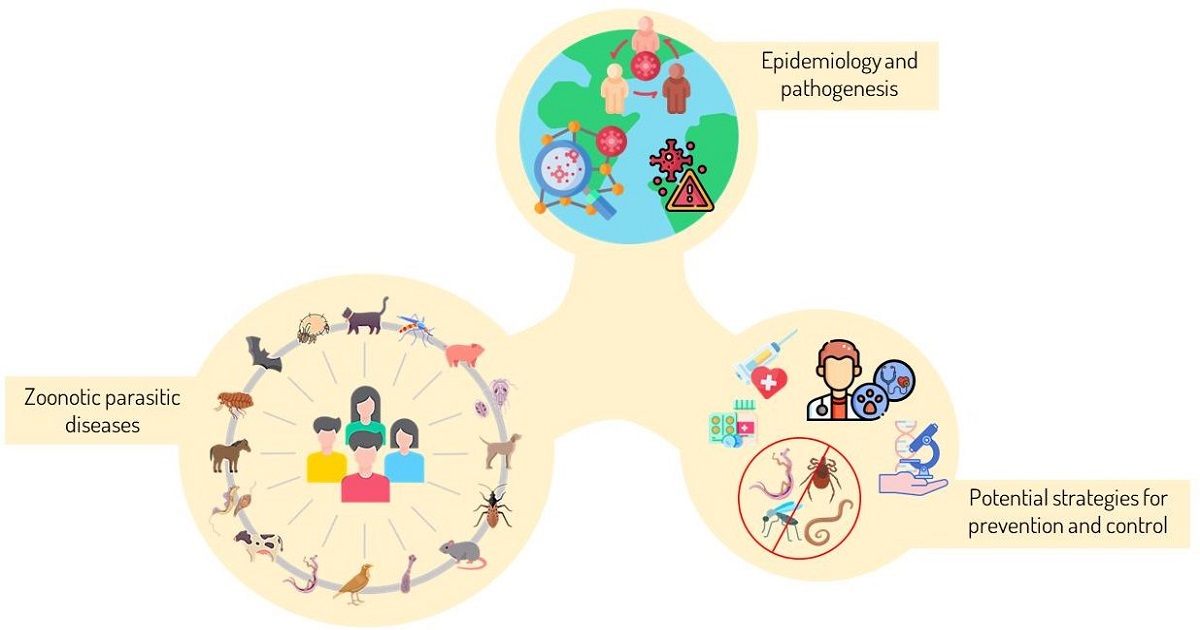Zoonotic Parasitic Diseases: Emerging Issues and Problems
A special issue of Tropical Medicine and Infectious Disease (ISSN 2414-6366). This special issue belongs to the section "Vector-Borne Diseases".
Deadline for manuscript submissions: closed (31 December 2024) | Viewed by 2599

Special Issue Editors
Interests: parasitic diseases; rickettsioses; zoonoses; tick-borne diseases
Special Issues, Collections and Topics in MDPI journals
Interests: neglected diseases; toxoplasmosis; neosporosis; giardiasis; cryptosporidiosis; leishmaniases
Special Issues, Collections and Topics in MDPI journals
Special Issue Information
Dear Colleagues,
In recent years, the world has witnessed a surge in zoonotic parasitic diseases, posing significant threats to both human and animal populations. As ecosystems evolve and human–animal interactions intensify, the dynamics of these diseases are undergoing rapid transformations. To comprehensively address the emerging issues and problems associated with zoonotic parasitic diseases, we propose a Special Issue titled "Zoonotic Parasitic Diseases: Emerging Issues and Problems". This Special Issue aims to gather cutting-edge research that sheds light on the intricacies of zoonotic parasitic diseases, and their epidemiology, pathogenesis, and potential strategies for prevention and control.
The Special Issue will encompass a broad spectrum of topics, encouraging interdisciplinary research to foster a holistic understanding of zoonotic parasitic diseases. Topics of interest include, but are not limited to the following:
- Evolving Parasite–Host Dynamics: Investigating the changing patterns of host specificity and adaptation in zoonotic parasites, with a focus on the genetic and ecological factors influencing these dynamics.
- Climate Change and Vector-Borne Diseases: Exploring the impact of climate change on the distribution, abundance, and transmission of vectors responsible for zoonotic parasitic diseases, and proposing adaptive strategies for mitigation.
- One Health Approaches: Emphasizing the interconnectedness of human, animal, and environmental health, and showcasing successful One Health interventions for the prevention and control of zoonotic parasitic diseases.
- Novel Diagnostics and Therapeutics: Highlighting advancements in diagnostic tools and therapeutic interventions, including the development of new drugs and vaccines to combat zoonotic parasitic diseases.
- Surveillance and Early Warning Systems: Evaluating existing surveillance systems and proposing innovative approaches for early detection and rapid response to emerging zoonotic parasitic diseases.
Submission Guidelines:
Researchers are invited to submit original research articles, reviews, and perspectives that contribute to the understanding of zoonotic parasitic diseases. Cross-disciplinary studies that integrate knowledge from fields such as parasitology, epidemiology, ecology, veterinary and human medicine, and climate science are particularly encouraged. Manuscripts should strive to bridge the gap between research and practical applications, providing valuable insights for policymakers, healthcare professionals, and researchers alike.
By fostering collaboration and knowledge exchange, this Special Issue aims to propel the scientific community towards effective strategies in the prevention, control, and management of zoonotic parasitic diseases, ultimately contributing to the well-being of both humans and animals in our changing world.
Dr. Vinícius Longo Ribeiro Vilela
Dr. Thais Ferreira Feitosa
Guest Editors
Manuscript Submission Information
Manuscripts should be submitted online at www.mdpi.com by registering and logging in to this website. Once you are registered, click here to go to the submission form. Manuscripts can be submitted until the deadline. All submissions that pass pre-check are peer-reviewed. Accepted papers will be published continuously in the journal (as soon as accepted) and will be listed together on the special issue website. Research articles, review articles as well as short communications are invited. For planned papers, a title and short abstract (about 100 words) can be sent to the Editorial Office for announcement on this website.
Submitted manuscripts should not have been published previously, nor be under consideration for publication elsewhere (except conference proceedings papers). All manuscripts are thoroughly refereed through a single-blind peer-review process. A guide for authors and other relevant information for submission of manuscripts is available on the Instructions for Authors page. Tropical Medicine and Infectious Disease is an international peer-reviewed open access monthly journal published by MDPI.
Please visit the Instructions for Authors page before submitting a manuscript. The Article Processing Charge (APC) for publication in this open access journal is 2700 CHF (Swiss Francs). Submitted papers should be well formatted and use good English. Authors may use MDPI's English editing service prior to publication or during author revisions.
Keywords
- parasite–host dynamics
- interdisciplinary research
- one health solutions
- human–animal interactions
- climate change impact
- global health
- vector-borne diseases
Benefits of Publishing in a Special Issue
- Ease of navigation: Grouping papers by topic helps scholars navigate broad scope journals more efficiently.
- Greater discoverability: Special Issues support the reach and impact of scientific research. Articles in Special Issues are more discoverable and cited more frequently.
- Expansion of research network: Special Issues facilitate connections among authors, fostering scientific collaborations.
- External promotion: Articles in Special Issues are often promoted through the journal's social media, increasing their visibility.
- Reprint: MDPI Books provides the opportunity to republish successful Special Issues in book format, both online and in print.
Further information on MDPI's Special Issue policies can be found here.







